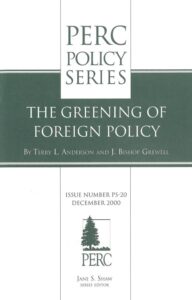DOWNLOAD THE FULL REPORT
Bringing environmental issues into foreign policy-making and international law endangers trade, national sovereignty, and, ironically, long-term environmental improvement, according to two associates of the Political Economy Research Center (PERC).
The rise of international environmentalism is posing grave dangers for the conduct of foreign policy, while at the same time shortchanging long-run environmental protection in favor of currently popular ‘green’ causes write Terry L. Anderson and J. Bishop Grewell in The Greening of Foreign Policy. They contend that long-term environmental quality is best served by freeing up trade and decentralizing environmental decisions. If an environmental problem can be handled internally, there is no need for international regulations that encourage encroachment on sovereign powers and discourage democratic accountability,” they write.
Among other policies, the authors raise questions about the composition of the International Whaling Commission, the diversion of defense funds to protecting endangered species, and the tilting of free-trade agreements toward environmental goals.
Terry L. Anderson is executive director of PERC and a senior fellow of the Hoover Institution. J. Bishop Grewell is a research associate of PERC. This paper is partly based on a new book edited by Anderson and Henry I. Miller, The Greening of U.S. Foreign Policy, which was published by the Hoover Press.
The new paper, part of the PERC Policy Series, is available from PERC in a 32-page booklet as well as here on PERC’s website. It is the latest in a series of policy papers edited by Jane S. Shaw and produced by Dianna Rienhart.
Download the full report, including endnotes and references.




